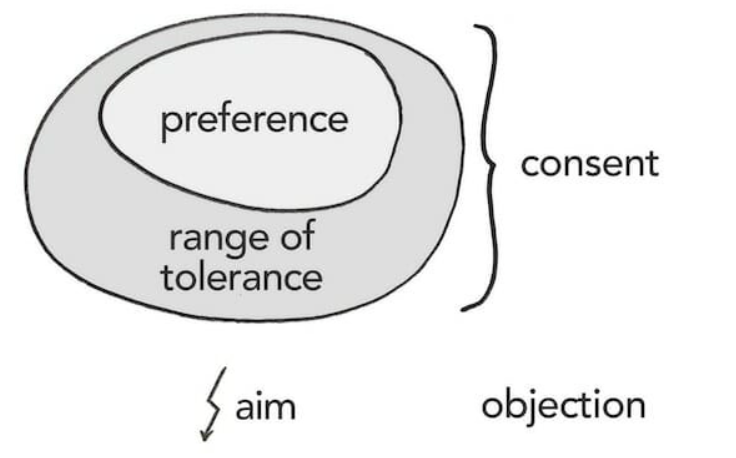Sociocracy and Reframing Consent
Originally published July 13, 2021
We need to reframe consent and consensus in relationships and community as a question of values and integrity over comfort and preference.
There is a horizontal organizational model called sociocracy that provides a definition of consent that challenges many of us to reconsider what consent is, and what healthy consent looks like.
Consent as defined by sociocracy as a method of consensus does not ask what people prefer, but rather what people object to.
There is a personal range of tolerance, within which lies one’s preference. A decision that is agreed upon may not be within the realm of preference, but within one’s range of tolerance.

This flies in the face of the popular notion of consent as an enthusiastic yes, and yet this definition of consent offers greater resilience in personal relationships and communal decision making because it is rare that two people, let alone a whole group, will find themselves consistently agreeing upon things from a place of enthusiastic yeses.
Long term, intimate connections with others will at times require us to be flexible with our range of comfort.
And I would even go so far as to say that range of tolerance may not even be enough.
Rather than putting focus on the feelings that a conflict or decision evokes in us, we should be shifting our perspective towards something more concrete and knowable:
our values.
Sometimes we will want something our partner does not and vice verse. And sometimes we will be confronted with a choice between our preference and comfort and something that will keep our relationship healthy and alive.
It is in these moments that we need to radically re-frame these decisions as being fundamentally about integrity and values.
Sometimes we will want something our partner does not and vice verse. And sometimes we will be confronted with a choice between our preference and comfort and something that will keep our relationship healthy and alive.
It is in these moments that we need to radically re-frame these decisions as being fundamentally about integrity and values.
Anxiety and discomfort alone are not solid places from which to make decisions.
Anxiety and discomfort alone are not solid places from which to make decisions.
Growing requires us to tolerate discomfort. It requires us to say
“I want this more than I than I want to avoid being uncomfortable.”
If we want strong, diverse, and resilient communities, we are going to have to face the discomfort of difference. We are going to have to face the discomfort of allowing ourselves to be influenced by others. We are going to have to face the discomfort of standing in our integrity when we truly aren’t able to budge.
Reframing Consent
Originally published July 13, 2021
We need to reframe consent and consensus in relationships and community as a question of values and integrity over comfort and preference.
There is a horizontal organizational model called sociocracy that provides a definition of consent that challenges many of us to reconsider what consent is, and what healthy consent looks like.
Consent as defined by sociocracy as a method of consensus does not ask what people prefer, but rather what people object to.
There is a personal range of tolerance, within which lies one’s preference. A decision that is agreed upon may not be within the realm of preference, but within one’s range of tolerance.
This flies in the face of the popular notion of consent as an enthusiastic yes, and yet this definition of consent offers greater resilience in personal relationships and communal decision making because it is rare that two people, let alone a whole group, will find themselves consistently agreeing upon things from a place of enthusiastic yeses.
Long term, intimate connections with others will at times require us to be flexible with our range of comfort.
And I would even go so far as to say that range of tolerance may not even be enough.
Rather than putting focus on the feelings that a conflict or decision evokes in us, we should be shifting our perspective towards something more concrete and knowable:
our values.
Sometimes we will want something our partner does not and vice verse. And sometimes we will be confronted with a choice between our preference and comfort and something that will keep our relationship healthy and alive.
It is in these moments that we need to radically re-frame these decisions as being fundamentally about integrity and values.
Sometimes we will want something our partner does not and vice verse. And sometimes we will be confronted with a choice between our preference and comfort and something that will keep our relationship healthy and alive.
It is in these moments that we need to radically re-frame these decisions as being fundamentally about integrity and values.
Anxiety and discomfort alone are not solid places from which to make decisions.
Anxiety and discomfort alone are not solid places from which to make decisions.
Growing requires us to tolerate discomfort. It requires us to say
“I want this more than I than I want to avoid being uncomfortable.”
If we want strong, diverse, and resilient communities, we are going to have to face the discomfort of difference. We are going to have to face the discomfort of allowing ourselves to be influenced by others. We are going to have to face the discomfort of standing in our integrity when we truly aren’t able to budge.
in other words: we are going to have to understand our communal decisions as being about values rather than our own comfort.
